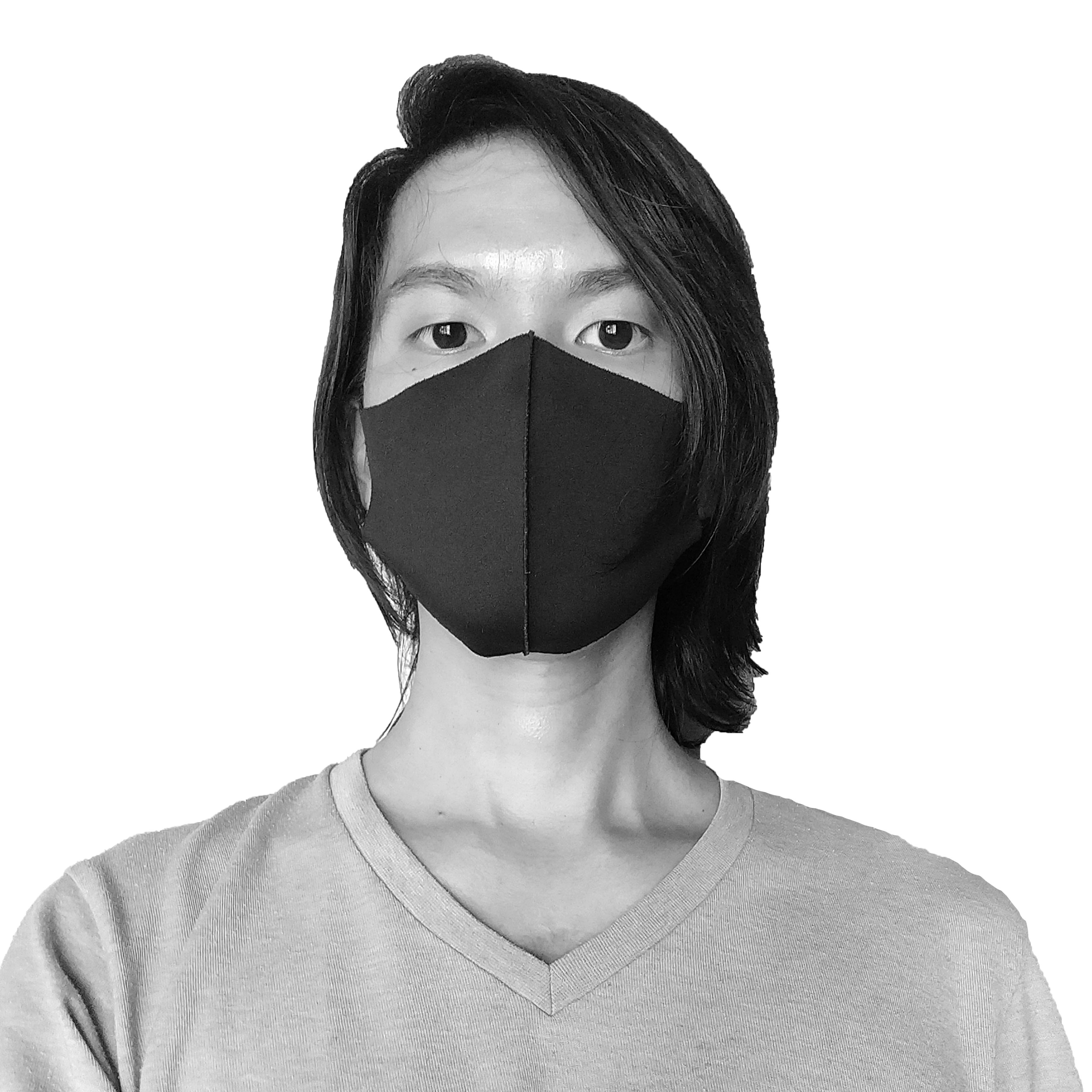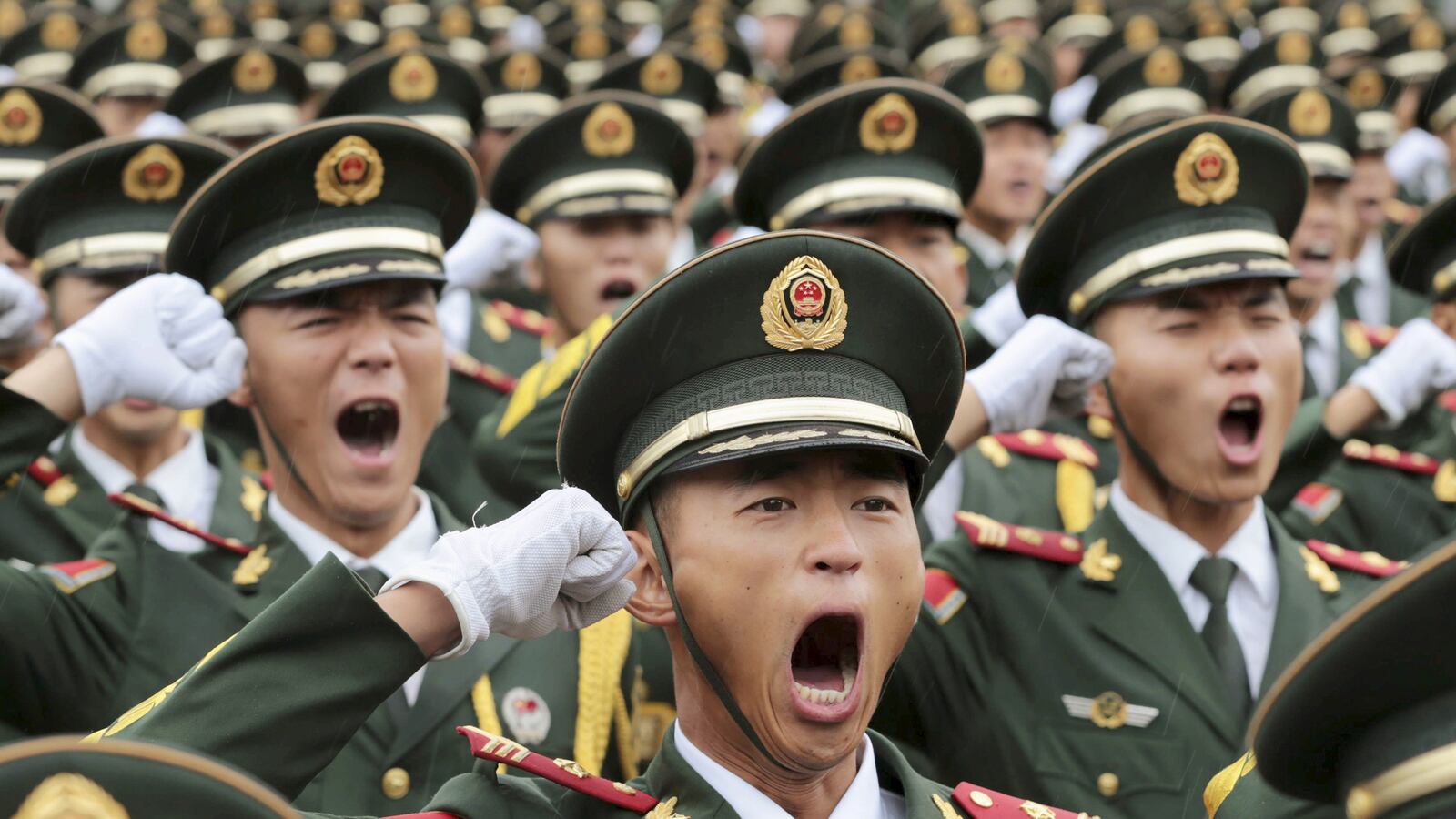HONG KONG — For a while, again, the sky was blue in Beijing. Chinese netizens called it #ParadeBlue.
The engineered limpidity was meant to be the perfect backdrop for a display of seven types of missiles, stealth fighter jets, a new bomber, aircraft carrier-killing munitions, tanks rolling by Tiananmen Square, and wave upon wave of uniformed men and women marching in step. It was meant to be a mark of achievement for the Chinese government and its military. And maybe a new source for calendar revenues.
At 10 a.m. Beijing time, after performances of music titled “Song of the Anti-Japanese War Military Political School” and “Song of the Guerrillas,” there was a 70-gun salute—because 70 years have passed since Japan’s surrender—followed by 121 steps by the honor guard to a flag pole—121 reflects the number of years since the first shot was fired in the conflict with Japan, clarifying what this grand parade is about.
In Chinese President Xi Jinping’s address to the nation and beyond, he promised to cut 300,000 troops from active duty. That’s a 13 percent reduction from the 2,285,000 personnel that form the CCP’s military. (In fact, Xi is planning a much more significant overhaul of the People’s Liberation Army.)
That is probably the most concrete plan that echoes Xi’s sentiment that “the Chinese nation is peaceful, and will never seek hegemony.” Yet today’s parade still comes off as excessive and belligerent.
PHOTOS: Inside China’s Massive Military Parade

As President Xi’s vehicle rolled down Chang’an Avenue, he stood through the sunroof and addressed the troops: “Hello, comrades! ... Thank you for your hard work, comrades!” He was not stern, not stoic, but with the enthusiasm of a bored schoolboy at a general assembly, typical of his public appearances.
It took a lot to disperse the polluted haze. Ten thousand factories in seven provinces were temporarily shut down. Workers on 40,000 construction sites were told to take time off. Automobiles were banned from driving in some parts of the capital. With tight traffic restrictions, a curfew, and other controls in place—hotel rooms couldn’t be booked, retail and entertainment businesses were asked to stay closed, and the Chinese Communist Party mobilized 850,000 “volunteers” to patrol the capital—residents in Beijing felt like they were being subjected to martial law in the past few days.
Other inconveniences were mere itches, but still annoying. Drone sales were cancelled or suspended. Hospitals stopped non-emergency services. Open-air barbecues were banned. Patrons in restaurants were asked to present identification before ordering (because, apparently, waiters in Beijing are now security experts). National flags were required to be put up. It almost seemed like the CCP didn’t want anyone except its military in the capital.
But, hey, at least the sky was blue. A popular CCP mouthpiece, The People’s Daily, did its job and made sure the government received credit for bringing back the good weather, as if allowing citizens to inhale normal air for a few days is a major accomplishment.
This was all done to “celebrate” what the CCP calls the 70th anniversary of Chinese People’s Anti-Japanese War and the World Anti-Fascist War Victory Commemoration Day. In that long-winded and passive-aggressive mouthful, “World Anti-Fascist War” refers to World War II. Today was even marked as a public holiday to ensure the entire country could take part in the festivities, which culminated in the form of the nation’s biggest military parade in decades.
Yet a question arose: Did the Chinese government put so many security measures in place because it was afraid its own citizens would cause trouble for the 12,000 military personnel on Beijing’s boulevards?
In fact, notices appeared in residential compounds near the parade’s route: Please close your windows and don’t peek out. How were the people of Beijing supposed to enjoy what state media calls “unique scenery” of the People’s Liberation Army Band?
Thirty heads of states attended the parade. Aside from South Korea’s Park Geun-hye and Russia’s Vladimir Putin, the rest of the list reads like a roll call for tin pot dictators. This includes Sudanese President Omar Hassan al-Bashir, who still has active warrants for his arrest issued by the International Criminal Court. China is not a member of the ICC, but if the CCP and its army are so committed to keeping world peace, what message are they sending when a genocidal tyrant is invited as an honored guest to their grandest public ceremony in years?
The CCP has a bad habit of dredging up the past and rewriting history, particularly when it comes to its role in Imperial Japan’s defeat seven decades ago. Television stations are regularly blitzed with serial dramas and “documentaries” that aggrandize what Mao and his followers did during the war. A film studio operated by the People’s Liberation Army reached apex absurdity by producing a film that features Mao Zedong as a powerbroker at the 1943 Cairo Conference, even though he didn’t attend the event and had no influence over its proceedings.
The CCP consistently ignores the fact that the Nationalist Party, which fled to Taiwan, did most of the fighting and lost well over 3.2 million troops. Mao’s Communists, on the other hand, suffered about 450,000 casualties. Nonetheless, the CCP has appropriated the defeat of Imperial Japan as part of the mythical founding of a new China, with itself at the helm.
Yes, Japan committed many despicable acts in China during that time, including the Rape of Nanjing, as well as the experimentation of biological and chemical weapons on civilians. They left scars both physical and mental across the country, but that doesn’t make the CCP heroes of the Chinese nation. When the Japanese formally surrendered on September 3, 1945, it was to the Allies on an American naval ship. Chiang Kai-Shek, who led the Nationalist government of China, was the Allied commander for China at the time.
The Party and its media arms constantly make public calls for Japan to apologize for its transgressions. Over the years, the Japanese government has already done so over 50 times.
The irony is that, without the Japanese invasion in the 1930s, Chiang’s Nationalist government wouldn’t have been weakened enough for Mao’s successful power grab and eventual ascendence, and China would be a very different country now.
Nowadays, veterans who took their commands from Chiang Kai-Shek instead of joining Mao Zedong’s rabble-rousers are consistently neglected by the Chinese government. The narrative of a unified China makes for good propaganda, but doesn’t match reality.
To make sure that the parade is presented with right veneer, the Party’s censors have been hard at work. Some users of VPNs and anti-censorship apps experienced difficulties accessing information that is blocked by the Great Firewall.
On Weibo, China’s popular micro-blogging site, the hashtag “use your fingertips to safeguard the parade” generated ongoing discussions and over 120 million views. Chinese netizens are encouraged to discuss the parade on social media, to ”goose-step on the web” and “become valid participants of the cyber parade.” But they have to be careful about what they say because all public discourse about the event is being filtered. If they’re not saluting the CCP, their voice is stifled.
The CCP has taken a massive publicity hit in the past weeks. The chemical explosions in Tianjin were tragic… and inconvenient. The recent stock market crash was bruising… and also inconvenient. With revelations that the Tianjin-based company whose cargo blew up was founded by the son of a local police chief and an executive at a state-run enterprise, and an absent upturn in the stock market despite billions of yuan injected by the government, the CCP might have been banking on today’s parade as a distraction from its series of unfortunate events.
So call China’s parade insecure chest-thumping. Call it unchecked bravado and hubris. It might even be called saber-rattling, since China is entangled in territorial disputes in the South and East China Seas (mainly with, of course, Japan). But don’t call it a celebration like the CCP does.
Chinese citizens are proud of what they achieved in the past 30 years, and they know that the nation has attained influential primacy in East Asia, but that pride is not derived from contrived militaristic jingoism. Blind nationalism puts a sour taste in their mouths. In the meantime, some are taking the long weekend to go shopping—not in Beijing or Shanghai, but in Hong Kong or Seoul or Tokyo or Taipei. After all, whatever legends the CCP tries to wrap itself in, whatever sick obsession the Party has with looking like saviors, to the rest of the country, September 3 is only a bonus break near the weekend.





